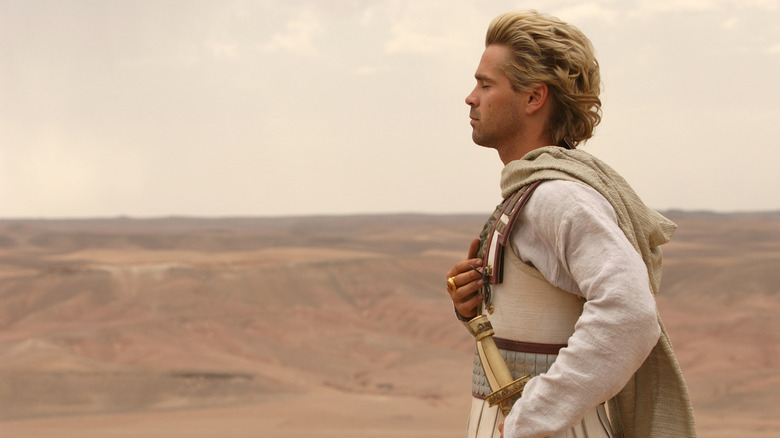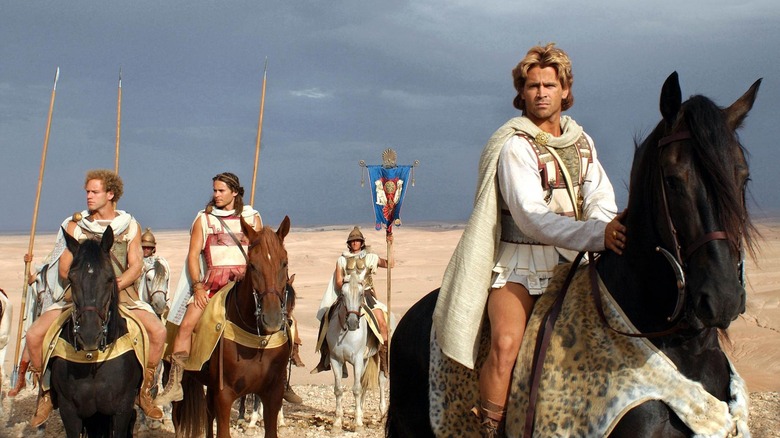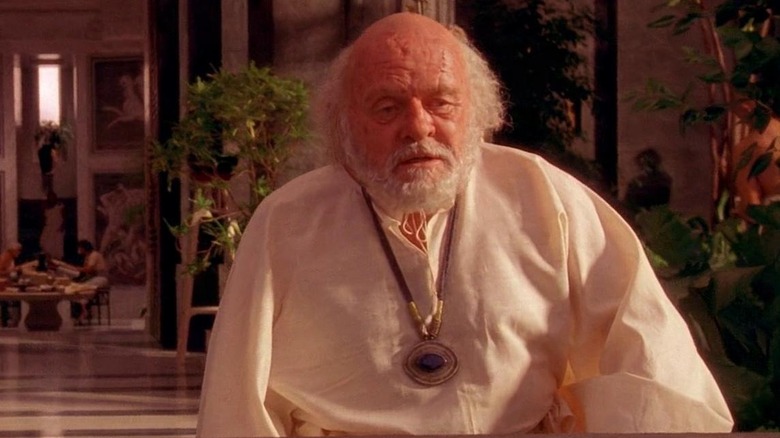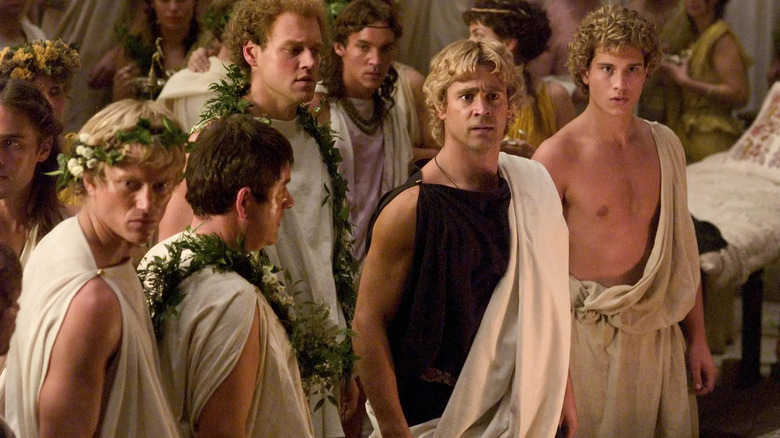20 Years Ago, Colin Farrell Led A Box Office Flop Of Historic Proportions
(Welcome to Tales from the Box Office, our column that examines box office miracles, disasters, and everything in between, as well as what we can learn from them.)
"We all had our tuxedos ready. I'm not even joking," Colin Farrell said in a 2023 interview with The Hollywood Reporter, reflecting on the 2004 historical epic "Alexander," directed by Oliver Stone. "We were all like, 'Right, lads, we're off to the Oscars. This is a sure thing.' And then it came out."
It came out, indeed, and as alluded to by the Oscar-nominated actor (not for this movie, it should be noted), things didn't exactly go as planned. In the aftermath of Ridley Scott's Best Picture-winning "Gladiator," Stone finally had the opportunity to scrape together funding for his three-hour take on Alexander the Great. The timing seemed perfect. The cast was a murderer's row. The production had all of the resources in the world at its disposal. But by just about every measure, the outcome was nothing shy of an epic disaster.
In this week's Tales from the Box Office, we're looking back at "Alexander" in honor of its 20th anniversary. We'll go over the film's long journey to screen, how things came together in the aftermath of "Gladiator," what happened during the grand production, what happened when the movie hit theaters, the aftermath of the theatrical release, and what lessons we can learn from it all these years later. Let's dig in, shall we?
The movie: Alexander
The film centers on the famed ancient Macedonian general Alexander the Great (Farrell), who becomes King and leads a years-long campaign of war. He faces massive armies in Persia, Afghanistan, and India, with the legendary figure conquering much of the world in the process. The film is at least in part inspired by a nonfiction book called "Alexander the Great" by historian Robin Lane Fox. As these things go, liberties were taken along the way.
Context is important here. Because "Gladiator" was such a critical and commercial success, it was easier for an A-list director to pitch something cut from a similar cloth. It hardly matters that movies like 1999's "The 13th Warrior" were massive box office bombs. These movies are always big risks, but Hollywood is big on attempting to emulate success.
Stone, coming off of his 1999 football drama "Any Given Sunday," was arguably at the height of his powers as a director, if not close to it. He had long eyed a potential Alexander the Great biopic and saw an opportunity to finally make it happen. Speaking with the BBC in 2004, the filmmaker explained that the version he had been developing years earlier with Val Kilmer in the lead never quite came together. He also wasn't ready for the task as a director in those earlier days.
"I couldn't have done this story when I wanted to do it 15 years ago [with Val Kilmer]. I then wrote a script in 1996 on the Greek Island of Mykonos. It was Tom Cruise who wanted to play Alexander at the time, but I didn't like the script and then kind of gave up."
Another important thing to note is that, at the time, Baz Luhrmann ("Moulin Rouge!") was developing his own Alexander the Great movie with Leonardo DiCaprio ("Titanic") and Mel Gibson ("Braveheart") attached to star. So there was a ticking clock at play here.
Alexander gets made on the largest scale imaginable
Ultimately, Stone cobbled together financing from several production companies, with Warner Bros. on board to distribute the film in North America. As far as casting goes, Colin Farrell ("Minority Report," "Phone Booth"), who was one of the hottest stars in the business at the time, nabbed the lead role. Farrell, at that time, was also known for his off-screen behavior — particularly his substance use.
The ensemble also included a murder's row of talent, with Angelina Jolie ("Girl, Interrupted"), Val Kilmer ("The Saint"), Anthony Hopkins ("Red Dragon"), and Rosario Dawson ("The Rundown") starring alongside Farrell. Stone had a ridiculously huge $155 million budget to work with, which would be like having a $255 million budget in today's dollars, making it irresponsibly expensive. But Stone tried to put the money on screen, filming on three different continents during the six-month production. That included using real elephants and dealing with Farrell breaking his leg in an off-set accident.
Stone also employed experts such as Robin Lane Fox from Oxford University to try and infuse some historical accuracy into the film. In a 2024 video for Invicta, historian Dr. Roel Konijnendijk gave credit where credit is due, saying "Alexander" nailed the accuracy of the battle scenes.
"The way it looks is frankly unrivaled. There's no other movie that does this much to try and portray the formations as they actually looked...The advisers on this movie were really a crack team of scholars...Because the director really gave them a lot of leeway and listened to them, the result is the most accurate in terms of its faithfulness to the sources. The most accurate depiction of ancient combat that we have."
At the same time, a group of Greek lawyers were upset with the film over a potential insinuation that Alexander the Great was bisexual. Ultimately, a lawsuit was dropped. "Fortunately it was not what we had feared. The people can go and see the movie," said lawyer Giannis Varnakas to the BBC at the time. "There is a kiss that can be interpreted in many ways, but we have avoided the worst."
The financial journey
Despite all of the money and all of the promising pieces on the board, Stone couldn't quite deliver on the potential — at least not at first, but we'll get to that. "Alexander" clocked in at nearly three hours, and unfortunately, critics were largely not on its side. One of the only plus sides, at least on paper, is that the film was opening over the long Thanksgiving holiday frame. In the end, that only helped so much.
"Alexander" hit theaters on Wednesday, November 24, 2004. Hollywood studios will often release films the day before Thanksgiving to benefit from the full five-day window. It worked quite well for "The Hunger Games: The Ballad of Songbirds and Snakes" and "Napoleon" in 2023. Not so much for Warner Bros. and Stone here, as the epic biopic tanked with a $13.6 million opening weekend, landing at number six on the charts. Disney's "National Treasure" held onto the top spot in its second weekend, while "Christmas with the Kranks" landed at number three in its debut.
Over the five-day holiday stretch, the film's total only grew to $21.8 million. With a wave of negative reviews to fight against, it was dead in the water in the U.S. It fell off a cliff in weekend two and was fully out of the top by mid-December. It shed screens like crazy as movies like "Ocean's Twelve" and "Blade: Trinity" entered theaters. There were no Oscar nominations to fall back on, either. It pretty much was all bad news.
"Alexander" finished its run with a measly $34.2 million domestically to go with a far more healthy $133 million overseas for a grand total of $167.2 million worldwide. When accounting for marketing costs and the cut theaters take, it was a financial trainwreck.
The aftermath of Alexander's disastrous release
While no precise figure was cited (these things are often kept as secret as possible), the film lost tens of million of dollars in its theatrical run. "I never understood how a company like Warner Bros. could accept this kind of quality," producer Thomas Schühly said in reflection of the film in a recent piece for The Hollywood Reporter.
"I thought, 'What can I do?' I felt so much shame," Farrell said reflecting on the failure of "Alexander" in 2023. "I found myself in a place where with everyone I met I wanted to say, 'Have you seen 'Alexander?' If you have, I'm really sorry.' I'm not even joking."
Stone, for his part, had his own theories. As the filmmaker behind "JFK" and "Platoon" pointed out in a 2005 interview with The Guardian, the film performed far better overseas than it did in the U.S. His theory? American fundamentalism and the media essentially sabotaged the whole thing.
"There's a raging fundamentalism in morality in the United States. From day one audiences didn't show up. They didn't even read the reviews in the [American] south because the media was using the words: 'Alex is Gay'."
Over the years, Stone retooled the film several different times with four (yes, four) different versions eventually making it to home video. There was the "Director's Cut" in 2005, the "Final Cut" in 2007, and the "Ultimate Cut" in 2014. "It took me three years to get out a digital version that I finally was proud of, which not many know of because there was no advertising," Stone said in a 2012 Facebook post. "But at least it was put out by Warner Bros in their catalogue edition; it's called "Alexander Revisited" (2007). It's actually one of the biggest selling items in the catalogue, near 1 million copies were moved."
The lessons contained within
In some ways, the film eventually found its audience. The early 2000s still provided a robust home video market led by DVD, meaning that even a big bomb such as this could recoup some of its losses. The odds of "Alexander" ever turning a profit are slim to none, though. At the very least, the financiers were in the hole for a long, long time. It wasn't what anyone had in mind, that's for sure. This was no "Gladiator."
While "Horizon" director Kevin Costner is happy to point out that DVD is not dead, it isn't what it once was. That safety net no longer exists in the same way for the industry. VOD certainly helps, but streaming revenue hasn't yet made up for this once-mighty pillar of the industry, one that "Alexander" benefited greatly from. That's certainly worth reflecting upon 20 years removed.
Aside from that, this is a prime example of Hollywood letting a budget get far too high for no good reason. Is it cheap to make a historical epic? Of course not. But as we've seen in recent years, blockbuster movie budgets have spiraled out of control. Stone's passion project reveals that it's not a new issue by any means, it's just gotten much worse. Still, the lesson remains the same: Studios need to do a much better job of not allowing such things to happen in the first place. Budget responsibly, and such catastrophes can at least be mitigated, even if they can't be totally avoided.
Beyond that, this is a prime example of chasing success gone awry. "Gladiator" was a singular success story thanks to the brilliance of Ridley Scott and everything lining up just right. Replicating that success was, at best, not going to be easy and, more likely, would be almost impossible. Warner Bros. and Stone learned that the hard way. Hollywood would do well to be far more careful in attempting to emulate success stories. It's always far more complicated than "people want to see a big historical epic." Reductive thinking is a fast track to disaster.




